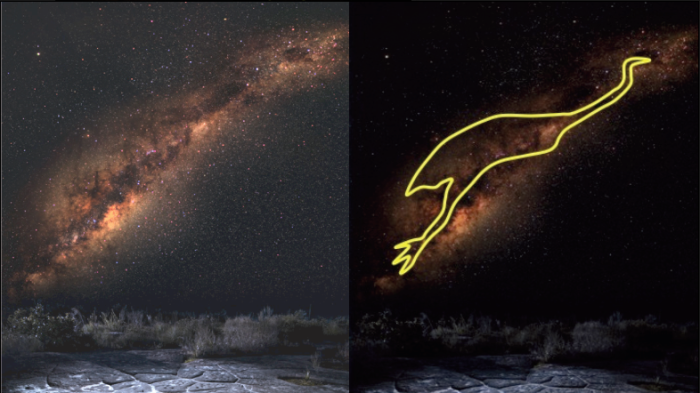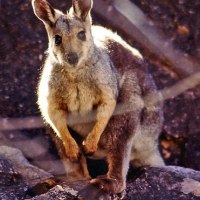Today’s post presents another story in Jiwarli with English translation, told to me by Jack Butler on 20th May1984 and explained on 20th-21st May 1984. There is information about the Jiwarli spelling.
Bulhabayara and Emu
This story deals with the god Bulhabayara who is cooking gajalbu Emu (Dromaius novaehollandiae) in a pit in the ground filled with hot ashes. While Bulharapaya went off to have a sleep, Emu is stolen and taken up into the sky. Bulhabayara discovers this because he sees a fly going up into the sky. He goes up into the sky on a gurlurr, a special type of cloud. The thief with the emu calls out for him to open his mouth in order to receive the gaadharri ‘emu gizzard’, which is considered to be a delicacy. When Bulhabayara opens his mouth the thief throws down a hot cooking stone (usually placed inside an animal to cook it) which goes into his throat killing him. The Emu remains in the sky today as a constellation (outlined by dark areas of the night sky, not by the stars). You can find out more about the Emu Constellation and how to locate it in the Southern Hemisphere sky on this website.

Emu Constellation

Emu
Ngunhaba ngunha Gajalbu ngarringga wandharninyja jirndinyungulu nguluba. Yawardamayi Bulhabayara Gardumayi. Bulhabayaralu ganyanyja birru ngunha. Mujiyarninyja Gajalbu ngarringga gambarninyjalu. Ngunha yananyja ngurndanhurru gumbayi. Gururrirarringu. Yanararringu ngurluba ngarrirla. Yirraradhu ngunha wurunggu ngarri galarnirninyjarru. Wuru ngunha dharrbarninyja ngardingga Gajalbula ngarringga ngurndiniyala. Jigalbalgarringurru. Bambarru gumbaja jigalbarnu. Wurudhu ngunha banyjinyjarru. Wuru ngunha banyjinyja mardurarru. Ngunhabadhu warninyja yarnararru. Ngurndaja ngunhaba gurlganyurringurru. Nhaanha yilu wandharninyja nyirnda ngarringga gajalbubarndila. Nhanyararri yuwirru buniya yirraragurirrarru gurlaniya wagararriya yuwi yirraragurirra. Nhanyangu ngurndirarri. Aa ngunharru ngunha Gajalbu ganyanyja jirndirlarru yirrararlarru. Gurlarninyjarru ngunhaba gurlarrbala barnumbala. Bilanagundi gurlarrba. Jirndinyungurru ngunha. Gurlarninyja ngunhaba. Gurlarninyja. Gurlarninyja. Ngunhaba gajalbujaga birrujaga wanggaja. Yirra dhaarrima nhurra. Gaadharri yinha ngadha nhurrala jugulga. Ngunhaba gurlganyundhurru yirra dhaarrinyja. Guburnmarru jugurninyja dhugudhugu. Gambarninyja ngunhaba wurrgalba wirndubinyangurru gardulyanha. Ngunharru gumbinha. Gajalbu gumbinha guwardi jirndingga. Gumbinha nhanyiniyala ngandhurralu wandinggundhi. Guwardi ngandhurralu ngunha wandinggundhi nhanyanha gumbiniya yirrara. Ngunhaba ngunha ngurndinha. Gumbinha ngunharru. Ngandhurranha nhanyanha burlugujilu ngabajulbu. Gajalbu ngunhaba yurnubarndi ngurrabarndi ganyanyja. Ngurra bularalaburradhu ngula Yawardamayilaburradhu ngurnumalulaburra. Yini ngunha biji nganamarnu. Ngadha ngarlarrinyjarru yininyjarriyi. Ngarlarrinyjarru ngadha yiniyi ngurnuba Gajalbuwu mujiyarninyjabarndiyi. Nguluba jirndinggarru wandharninyja. Ngunharru ngunha gumbinha guwardidhu. Bayalbarru.
Translation
Long ago, Bulhabayara the god put Emu in the ashes to cook. Yawardamayi, Bulhabayara and Gardumayi are the names of the gods. Bulhabayara carried the meat to cook it in the ashes. Someone stole Emu after Bulhabayara had put it to cook in the ashes. Bulhabayara went to lie down. He woke up and went to have a look at the ashes. On top of the ashes he went like this back and forth with a stick. He inserted the stick into the Emu lying in the ashes. He went to lift it up, but he couldn’t lift it. The stick broke; the stick broke in the middle, and Bulhabayara fell onto his back. He lay there thinking: “What has he put here in the ashes after taking the emu?” He saw a fly going up, climbing, and flying up. Bulhabayara lay down on the ground looking. He said to himself: “Oh, now that emu has been taken up into the sky”. He went up on his cloud, his gurlarr, which is like a cloud. He is a god. So he went up, he went up, he went up. The one with the emu meat up above called out: “Open your mouth! I’ll throw the gizzard to you.” Bulhabayara felt pleased and opened his mouth. The thief threw down a hot cooking stone and it burned that poor fellow’s throat, killing him. That is how it is. The Emu is in the sky now. It is there where we all can look at it. Now we all can look at it sitting up above. That is it lying there in the sky. It’s sitting there now, and looking at us below in turn. The Emu was carried from this place. The earth was soft at the time of Yawardamayi and that group of gods. There were many names for them but I have forgotten some of their names. I have forgotten the name of that one who stole the Emu. He put it in the sky, and that is why it is sitting there now. That’s the end of the story.












